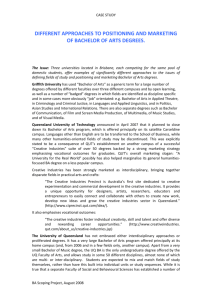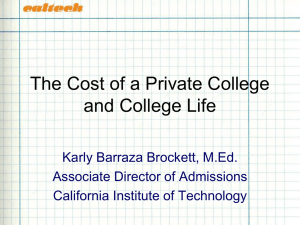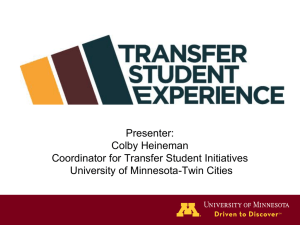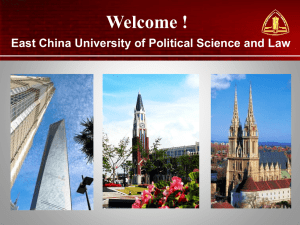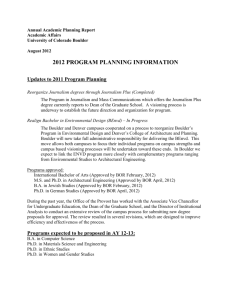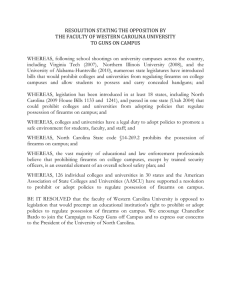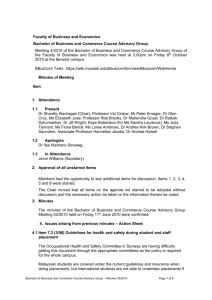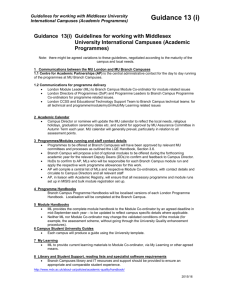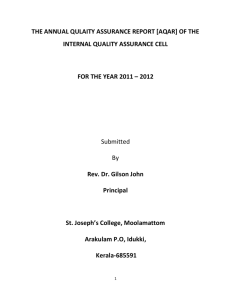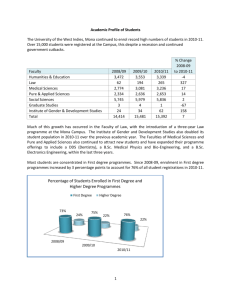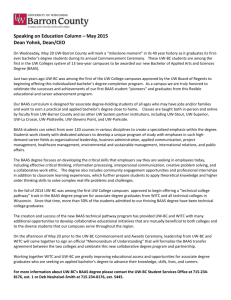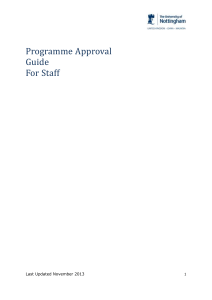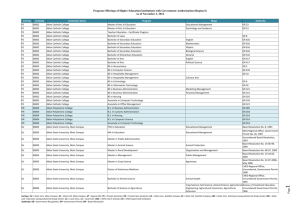Memorandum from the Parliamentary Office NATIONAL COUNCIL
advertisement
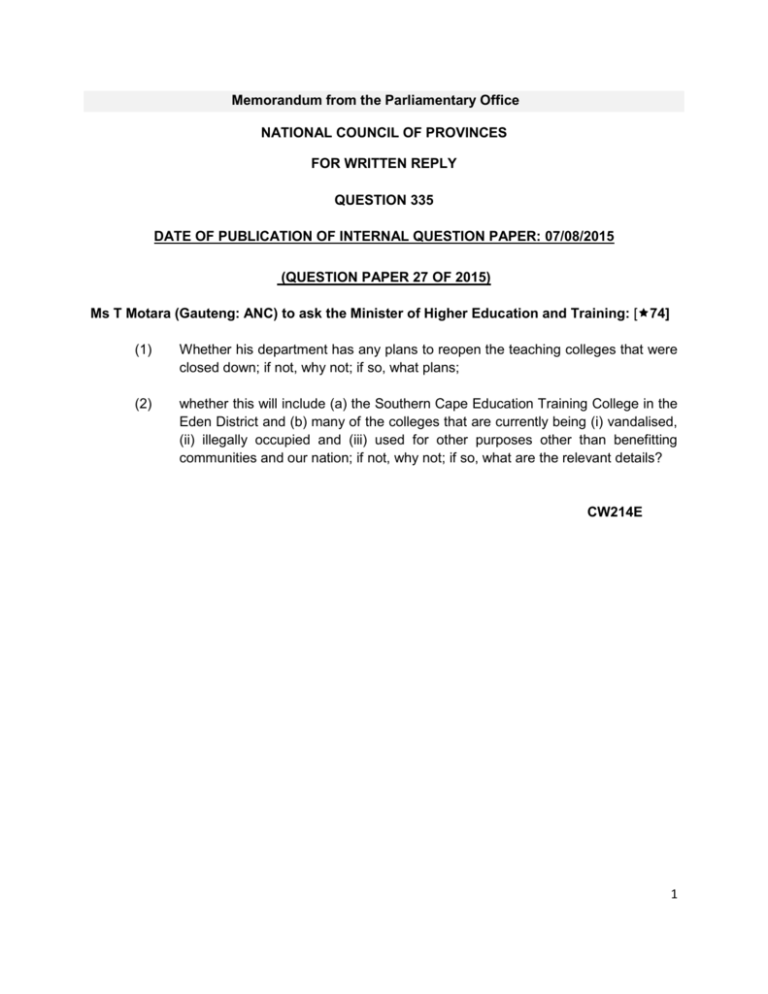
Memorandum from the Parliamentary Office NATIONAL COUNCIL OF PROVINCES FOR WRITTEN REPLY QUESTION 335 DATE OF PUBLICATION OF INTERNAL QUESTION PAPER: 07/08/2015 (QUESTION PAPER 27 OF 2015) Ms T Motara (Gauteng: ANC) to ask the Minister of Higher Education and Training: [74] (1) Whether his department has any plans to reopen the teaching colleges that were closed down; if not, why not; if so, what plans; (2) whether this will include (a) the Southern Cape Education Training College in the Eden District and (b) many of the colleges that are currently being (i) vandalised, (ii) illegally occupied and (iii) used for other purposes other than benefitting communities and our nation; if not, why not; if so, what are the relevant details? CW214E 1 REPLY: 1) Yes, my Department has been working consistently in re-opening teaching colleges that were closed down. These efforts to expand teacher education capacity in the country are in line with the strategies described in the “Integrated Strategic Planning Framework for Teacher Education and Development in South Africa, 2011-2025” which I jointly launched with Minister Motshekga in 2011. The Department is working in a logical and step-wise manner to develop institutional capacity to ensure that the country is able to produce sufficient quality educators for our schools by: ensuring full utilisation of university campuses that currently offer teacher education programmes; extending capacity by expanding the delivery of teacher education programmes to additional campus sites, which will be identified based on the analysis of geographical reach and quantified need; and if it is identified that the existing capacity after being strengthened and extended, is still unable to meet national and provincial needs, new institutions will be opened. The impact of these initiatives is displayed in the increase in enrolments and graduations in teacher education programmes. Current expansion efforts at universities have resulted in a substantial growth in the number of new teacher graduates since 2008. Enrolments in initial teacher education programmes, i.e. Bachelor of Education and Post Graduate Certificate in Education programmes, have increased from 35 275 in 2008 to 104 144 in 2013. Over the same period, the number of graduates has increased from 5 939 in 2008 to 16 496 in 2013. Other expansion initiatives that are in process include: Two new universities have been established and both will offer the full range of teacher education programmes once they become fully established. Sol Plaatje University has established a campus in Kimberly from which a Bachelor of Education in Senior Phase and Further Education and Training Teaching is being offered. The University of Mpumalanga has established two campus sites, one in Nelspruit and the other in Siyabuswa. The Siyabuswa campus is developing into a dedicated teacher education campus with 200 students enrolled in a Bachelor of Education programme. Nelson Mandela Metropolitan University is being supported to expand 2 teacher education at its Missionvale campus in Port Elizabeth through the establishment of a Foundation Phase Bachelor of Education programme. The Department has allocated significant financial resources to enable the development of new buildings to support the expansion of the campus. Durban University of Technology is being supported to substantially increase its teacher education capacity at its Indumiso campus in Imbali, Pietermaritzburg. Rhodes University is being supported to establish a full-time, contact Bachelor of Education in Foundation Phase Teaching in Grahamstown. Discussions are underway regarding the further expansion of teacher education capacity in the Eastern Cape and Limpopo provinces, which may result in former college sites in these provinces being re-used as teacher education facilities. My Department has recently concluded a national teacher supply-demand modelling exercise and the results show that in utilising capacity that is currently in place, the number of new teacher graduates annually will exceed 23 000 by 2020. This number of new graduates will match and slightly exceed the number of new teachers needed in the system annually. This analysis is corroborated by an independent study conducted by the Centre for Development Enterprise, which depicts a similar picture. The need to massively open any further campuses for teacher education purposes has diminished, and over the next five years, the Department will increasingly focus on strengthening the quality of teacher education in the country. 2) There are no plans to use the Southern Cape Education Training College site for teacher education purposes. My Department has recently conducted a survey of the former teacher training college sites to identify what they are currently being used for. The survey showed that of 107 former college sites: 45 are now used as Technical and Vocational Education and Training campuses; 14 have been incorporated as university campus sites, many for teacher education purposes; 15 are being used as schools; 3 9 are being used for other education-orientated purposes such as teacher development centres, multi-purpose centres; 15 are being used as government offices, including provincial, district or circuit education offices; 9 sites still need to be accurately verified; and 1 has been identified as vacant. The large majority of the former college sites continue to be used for education purposes. As we formally establish new Community Education and Training Colleges, the possibility exists for those former Colleges of Education, that are currently not utilised for education purposes, to be used as community college sites, where viable and possible. 4 Compiler/contact persons: Ext: DIRECTOR – GENERAL STATUS: DATE: REPLY TO QUESTION 74 APPROVED/NOT APPROVED/AMENDED Dr B NZIMANDE, MP MINISTER OF HIGHER EDUCATION AND TRAINING STATUS: DATE: 5



